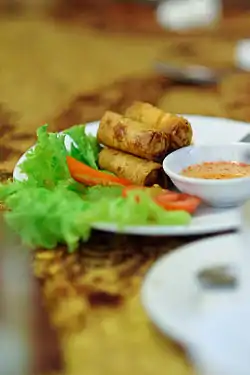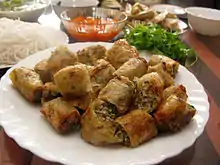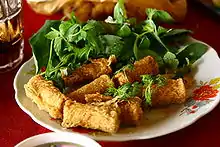Chả giò
Chả giò (Vietnamese: [ca᷉ː jɔ̂]), also known as fried spring roll, is a popular dish in Vietnamese cuisine and usually served as an appetizer in Europe and North America, where there are large Vietnamese diaspora. It is ground meat, usually pork, wrapped in rice paper and deep-fried.[1][2]
 | |
| Alternative names | Nem rán, imperial roll, Vietnamese fried spring roll |
|---|---|
| Course | Hors d'oeuvre |
| Place of origin | Vietnam |
| Region or state | East Asia |
| Main ingredients | Ground pork, mushrooms, cellophane noodles, various julienned vegetables (carrots, kohlrabi, jicama), rice paper |
Ingredients

The main structure of a roll of chả giò is commonly seasoned ground meat, mushrooms, noodles, and diced vegetables such as carrots, kohlrabi and jicama, rolled up in a sheet of moist rice paper . The roll is then deep fried until the rice paper coat turns crispy and golden brown.
The ingredients, however, are not fixed. The most commonly used meat is pork, but one can also use crab, shrimp, chicken, and sometimes snails (in northern Vietnam), and tofu (for vegetarian chả giò- 'chả giò chay'). If diced carrots and jicama are used, the stuffing is a little bit crunchy, matching the crispy fried rice paper, but the juice from these vegetables can cause the rolls to soften after a short time. If the rolls are to be stored for a long time, mashed sweet potato or mung beans may be used instead to keep the rolls crispy. One may also include bean sprouts and rice vermicelli. Eggs and various spices can be added to one's preference. Sometimes, the ingredients can include julienned taro root and carrots if jicama cannot be found. Taro roots give it a fatty and crunchy taste.

Chả giò rế is an uncommon kind of chả giò that uses bánh hỏi (thin rice vermicelli woven into a sheet) instead of rice paper. The stuffing inside the roll is the same as normal chả giò, and the roll is also deep fried. The sheets of bánh hỏi are narrow, and the rice vermicelli strands are brittle, chả giò rế rolls are often small and difficult to make. They are only seen at large parties and restaurants.
_-_06.jpg.webp)
The most interesting part in nem recipe is that it varies on different families and also different regions of Vietnam. No recipe is official. It depends on the custom of eating of each family. Therefore, in some ways the chả giò made by the wives show their cares for their own family.
Condiments
Chả giò can be eaten by itself, dipped into nước chấm or nước mắm pha (fish sauce mixed with lemon juice or vinegar, water, sugar, garlic and chili pepper), or served with rice vermicelli (in bún chả giò). Usually it is served with a dish of rau sống ( raw vegetable) containing several kinds of vegetable such as lettuce, coriander, etc. It is very common to wrap the chả giò in lettuce before eating it.
Confusion with other varieties of rolls
There can often be confusion as to what exactly is meant by nem depending on the circumstances. In Vietnam, there can be confusion between northerners and southerners because northerners tend to use the term nem to refer to a variety of different rice paper rolls containing meat, including gỏi cuốn, which Northerners call nem cuốn (often referred to in western restaurants as "salad rolls"). The southerners, however, tend to adopt a more precise definition of nem, using the word nem to only refer to ground meat food items like nem nướng (literally "grilled sausage", a minced pork sausage mixed infused with crushed garlic and fish sauce and then grilled).
Further confusion can occur outside of Vietnam because the English translation of chả giò varies according to restaurants' menus, chả giò is often confused with other dishes such as egg rolls or salad rolls. As chả giò made with rice paper can easily be shattered when fried, and also stay crispy for only a few hours, restaurants outside of Vietnam have adopted wheat flour sheet to make chả giò, in place of rice paper, thus blurring the difference between chả giò and the Chinese egg roll.
See also
References
- MiMi Aye - Noodle!: 100 Amazing Authentic Recipes 2014 -1472910613 Page 142 Chả giò is the Southern Vietnam name for the spring roll. In North Vietnamese communities, it's known as nem rán, which is why Asian traiteurs in Paris call their spring rolls 'nems'. Unlike most other spring rolls, its wrapper is made from rice ...
- Vu Hong Lien - Rice and Baguette: A History of Food in Vietnam 2016 - 1780237049 To wrap the rolls, spread a ricepaper wrapper on a flat surface and wipe it with a wet cloth to moisten. Spoon the mixture on to the ... Another type of roll is equally popular.
External links
| Wikimedia Commons has media related to Nem. |